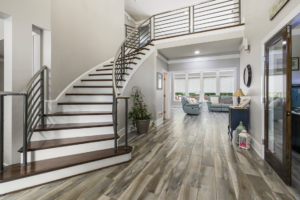By George House/17,Sep,2025
Choosing the right garage door is more than picking a color or style. Size is the first detail that shapes how the door works, fits, and lasts. With so many options, knowing the standard roll-up garage door sizes helps homeowners and business owners make smarter decisions.
A door that is too small leaves gaps, while one that is too large becomes a safety issue. The correct size means fewer repairs and more years of reliable use, regardless of whether it’s for a home, a workshop, or a warehouse. This guide breaks down dimensions, types, and costs in simple detail.
Why Size Matters in Roll Up Garage Doors

(Source)
The right garage door size impacts function, safety, and energy use. A mismatch in fit can lead to wasted money and ongoing problems. Let’s connect this point with the different roll-up garage door sizes you’ll see in homes and commercial spaces.
Residential Roll Up Garage Doors
The residential roll-up garage doors can typically be 8 to 18 feet in width. Common height is 7 or 8 feet, and this is adequate to fit most cars and small trucks. Newer houses might have bigger doors in case they have SUVs or vans.
Selecting the right size would help families to avoid cramming cars into small spaces. The U.S. Department of Energy states that about 30 percent of the household energy may be lost when there are openings in ill-fitted garage doors. The correct sizing ensures a reduction of that energy wastage.
Commercial Roll Up Garage Doors
The roll-up garage doors used for commercial purposes are larger than those used in the home. Commercial roll-up garage doors can extend up to 24 feet wide and up to 16 feet high. The warehouses, storage facilities, and workshops are supposed to be that big to enable the trucks or equipment to move freely.
According to the International Building Code, the commercial doors should comply with the local safety and clearance requirements. Companies that ignore size usually pay more in operational slack and repair. A well-fitting door ensures that it is more secure, lasts longer, and can be used on a daily basis with limited interruptions.
Standard Roll Up Garage Door Dimensions
Both seeking the appropriate dimensions and knowing the most used measures are important. It is where you need to start to find the roll-up garage door dimensions. Let’s take a closer look at the specifications of the roll-up garage door sizes regarding the application to various spaces.
Single-Car Garage Door Sizes
One garage normally requires a width of 8 to 10 feet and a height of 7 to 8 feet. This is the minimum standard in roll-up garage door width and height guides.
These dimensions accommodate sedans, compact SUVs, and small trucks. A door that is too small or too large beyond this size is normally accompanied by a structural or fitting difficulty.
Double-Car Garage Door Sizes
In case of two-car garages, the approximate dimensions of the roll-up garage door are normally 14-18 feet wide and 7-8 feet tall.
These doors enable two cars to be parked sideways without having to maneuver. These wider sizes are usually of use in families that have a car and a larger SUV. It ensures that they can easily accommodate both their vehicles in the garage.
Specialty Roll Up Garage Doors

(Source)
In addition to the conventional ones, there are also purpose-built doors. The nature of the door can be determined by the property, its use, and its design. Mini roll-up garage doors and custom roll-up garage doors fit both niche markets in the following way.
Mini Roll Up Garage Doors
These garage doors are smaller and are commonly employed in storage facilities or small sheds. They may be as low as 4 feet wide and 6 feet high. These are small doors that are cost-effective and can be used in areas where there is no need for huge doors.
In the U.S., there are numerous storage facilities. Most of them have mini roll-up doors due to their easy functionality and durability. They are a sound solution among homeowners for backyard sheds and workshops.
Custom Roll Up Garage Doors
Custom roll-up garage doors can be suitable for exact measurements of unusual spaces. They can be larger doors to accommodate RVs or smaller ones to fit in oddly shaped buildings. Although the price of custom doors is high, they are an exact fit that the standard sizes cannot provide.
The RV Industry Association (RVIA) reports that close to 11 million RVs are owned in the U.S. Some of those RVs need special garage doors, and hence custom doors become a preferable choice for them. They are preferred by homeowners and businesses to have flexibility and long-term savings on customizations.
How to Measure Roll Up Garage Door Sizes
Proper measurement eliminates expensive errors. Being aware of the roll-up garage door width and height is one of the assuring factors, as the door fits well and operates comfortably. But how can you get the right measurements? Let’s take a look at some of the fundamentals and some of the tools required.
Measuring Residential Doors
In the case of residential roll-up garage doors, the width of the door ranged across the opening. To measure the height of the door, you need to calculate the distance between the floor and the ceiling. The garage depth should also be checked to ensure that there is clearance for the roll.
Minor mistakes will result in gaps as the door will not close correctly. The Occupational Safety and Health Administration (OSHA) emphasizes the fact that the wrong installation of doors may increase the number of injuries. The initial step in eliminating safety issues is to take accurate measurements. The task will normally require only a steel tape measure and a notepad.
Commercial Doors Measurement
Commercial roll-up garage doors require special consideration. The use of these doors will usually be heavy-duty, and hence both height and clearance are crucial. Space that needs to be measured include tracks, openers, and clearance on the side.
Keep in mind that industrial facilities may become ineffective when the size of the doors fails to match the operational requirements. An effective measure minimizes wasted space and enhances workflow efficiency. The checks and balances of measurement before installation by a reliable contractor ensure avoiding replacing or resizing an object at a cost.
Conclusion
Choosing the right roll-up garage door sizes means better function, safety, and efficiency. Size shapes long-term value. Accurate measurement and the right chart save time and money. From mini roll-up garage doors to large commercial options.
Contact the George Group, which delivers reliable door solutions that match any property with precision.





